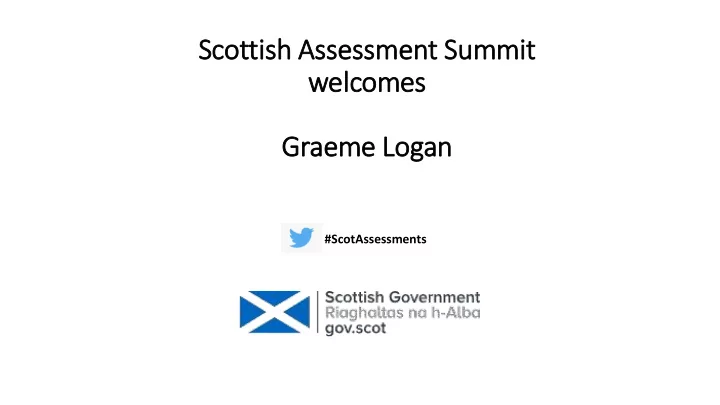

Scottish Assessment Summit welcomes Graeme Logan #ScotAssessments
Graeme Logan Director of Learning The Scottish Government @GLoganEd
Assessment - the way ahead? In its 2015 review of education in Scotland, the OECD made the following recommendation “ Strike a more even balance between the formative focus of assessment and developing a robust evidence base on learning outcomes and progression Improving Schools in Scotland: An OECD Perspective (2015): page 23
Assessment of Children’s Progress Evidence we gather • The percentage of children achieving curriculum levels in literacy and numeracy at P1, P4, P7 and S3 by school, local authority and nationally. • Data from a range of surveys on health and wellbeing showing changes over time. • Senior phase qualifications and awards data. • The percentage of school leavers in positive and sustained destinations.
Achievement of Curriculum for Excellence levels • Overall achievement of a level is based on teacher judgement, informed by a range of evidence • Teacher judgement is moderated and supported in a range of ways • Formal and informal moderation eg teachers talking about standards • No one piece of evidence has more ‘status’ than another • No one piece of evidence would ‘trump’ overall teacher judgement • Main focus of assessment is through ongoing classwork, informing next steps in learning and teaching
Achievement of CfE Levels We are confident that teacher professional judgement is robust and reliable in our school because…..
Assessment for learning
Assessment for learning Assessment by learning
Assessment for learning Assessment by learning Assessment is learning
Most assessment is ‘real time‘ and formative Formative assessment is the process used by teachers and children to respond to and improve learning during the learning Cowie and Bell (2009)
Effective feedback is at the heart of our approach to assessment • Feedback is powerful but variable on its impact on learning • Scores or comments with no focus on improvement might interfere with learning • Prior knowledge is the starting point for feedback • Feedback is about closing the gap between current and desired learning • Learner to teacher feedback is more important than teacher to learner • Effective feedback occurs when it is received and acted upon (Hattie and Clarke, 2019)
Does classroom assessment enable learners to reflect on… • Where am I going? • How am I going? • Where to next? (Hattie and Timperley, 2017)
The most important single factor influencing learning is what the learner already knows. Ascertain this and teach him accordingly. (Ausubel, 1968)
The power of peer-to-peer feedback ‘Receiving feedback sits at the intersection of two needs – our drive to learn and our need for acceptance… And most of us have a higher opinion of ourselves than others do of us. We judge ourselves by our intentions while others judge us by our impact’ (Stone and Heen)
Streamline assessment • Be clear and consistent on your assessment model • Review and reduce the assessment burden where this exists (hotspots?) • Know where the evidence is – you don’t always need to collect it all in one place! • Adopt a ‘high impact, bureaucracy light’ approach • Remember, improving children’s progress happens in practice not on paper!
www.scotlandscurriculum.scot
Purpose of the SNSAs • To inform teacher professional judgement about learning and teaching • SNSA is a formative assessment which can inform summative judgements (achievement of CfE levels) Flexibility on when to administer the SNSAs guards against data being aggregated to compare school performance
SNSAs: key educational issues • Confusion between a ‘moment of assessment’ and a pedagogical approach (play-based) • Progress with BGE assessment model • Learning, teaching and assessment are one. A blended, active experience? • SNSA often part of a more holistic discussion on children’s progress and improvement priorities at school level
Achievement of CfE levels: 2017/2018 • The percentage of pupils achieving the CfE level relevant for their stage was highest in listening and talking and lowest for writing in the primary stages. • Across all primary stages, around 85 per cent of pupils achieved the expected CfE level for their relevant stage in listening and talking; at least 75 per cent for numeracy and reading and over 70 per cent for writing. • For each organiser, a higher proportion of pupils living in the least deprived areas achieved the expected CfE level compared to pupils from the most deprived areas. The performance gap, between pupils from the most and least deprived areas, generally widens throughout the primary stages. • Pupils who have additional support needs or English as an additional language tend to perform lower than other pupils, at all stages and in all organisers. • The overall pattern of performance by stage and organiser is very similar to that reported in the Achievement of CfE Level 2016/17 results.
What is the story of children’s progress in your school?
Assessment data: What really matters? Your analysis and intervention to help every child make the best possible progress, based on a range of assessment evidence.
5 key areas for maximising progress with closing the poverty-related attainment gap • Additional, focused support where it is needed most. • Specific approaches which are making the biggest impact on improving children’s progress are shared and reflected on • Data for improvement . Ensuring that every school and every teacher can access an analysis of key data to drive improvement in learning and teaching • Embed successful approaches in to the curriculum. • Increase our collective efforts to improve the progress of children living in poverty
Recommend
More recommend